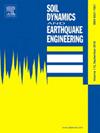结合物理模型和神经网络进行地震场地响应预测
IF 4.2
2区 工程技术
Q1 ENGINEERING, GEOLOGICAL
引用次数: 0
摘要
地震波的振幅在地球表面附近会被明显放大,这种现象被称为地震场地反应。场地反应预测对于建筑抗震设计和地震风险评估至关重要。然而,由于物理知识不完整和数据集数量不足,准确预测场地反应一直是个难题。在此,我们提出了一种将神经网络与经典的均质分层模型相结合的场地响应预测方法。这种方法从物理和数据两个角度挖掘了提高场地响应预测精度的潜力,降低了对模型复杂度和训练数据量的要求。与物理驱动法相比,该方法平均减少了约 50% 的估计误差,并修正了观测结果与预测结果之间的相关性。这种方法首先再现了整个地震带上场地反应的四阶段特征,为场地反应预测提供了一个新的框架。本文章由计算机程序翻译,如有差异,请以英文原文为准。
Combining physical model with neural networks for earthquake site response prediction
The amplitude of seismic waves will be significantly amplified near the Earth's surface, and this phenomenon is known as the seismic site response. Site response prediction is of paramount importance for the seismic-resistant building design and seismic risk assessment. However, accurately predicting site response has always been a challenge due to the incomplete physical knowledge and insufficient dataset volumes. Here, we propose an approach that combines the neural networks with classical homogeneous layered model for site response prediction. This approach exploits the potential for improving the accuracy of site response prediction from both the physical and data perspectives, which reduces the requirements for the model complexity and the training data volume. Compared to the physics-driven method, this approach reduces the estimation errors by approximately 50 % on average, and corrects the correlation between the observed and predicted results. This approach firstly reproduces the four-stage characteristics of the site response in the entire seismic band, and provides a new framework for site response prediction.
求助全文
通过发布文献求助,成功后即可免费获取论文全文。
去求助
来源期刊

Soil Dynamics and Earthquake Engineering
工程技术-地球科学综合
CiteScore
7.50
自引率
15.00%
发文量
446
审稿时长
8 months
期刊介绍:
The journal aims to encourage and enhance the role of mechanics and other disciplines as they relate to earthquake engineering by providing opportunities for the publication of the work of applied mathematicians, engineers and other applied scientists involved in solving problems closely related to the field of earthquake engineering and geotechnical earthquake engineering.
Emphasis is placed on new concepts and techniques, but case histories will also be published if they enhance the presentation and understanding of new technical concepts.
 求助内容:
求助内容: 应助结果提醒方式:
应助结果提醒方式:


